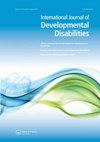智障人士的面对面和虚拟词汇学习
IF 1.4
4区 医学
Q2 EDUCATION, SPECIAL
International Journal of Developmental Disabilities
Pub Date : 2024-07-05
DOI:10.1080/20473869.2024.2371675
引用次数: 0
摘要
轻度智障人士(ID)往往难以理解和表达高级语言概念。在 COVID-19 问世之前,没有任何有研究支持的方法来帮助他们理解和表达高级语言概念。本文章由计算机程序翻译,如有差异,请以英文原文为准。
Face-to-face and virtual vocabulary learning for individuals with intellectual disabilities
People with mild intellectual disabilities (ID) often have difficulties understanding and expressing advanced linguistic concepts. Prior to the arrival of COVID-19, there were no research-backed mo...
求助全文
通过发布文献求助,成功后即可免费获取论文全文。
去求助
来源期刊
CiteScore
4.10
自引率
9.50%
发文量
81
期刊介绍:
The IJDD publishes scientific articles on work dealing with different approaches to the habilitation problems of people with an intellectual disability. The Journal covers the entire spectrum of intellectual disabilities, and is concerned with definitions, IQ, genetic predisposition, evaluation of abilities, learning interventions, challenging behaviour, medication, attitudes to death and bereavement, sexuality, legal aspects, WHO, NICE and other governmental guidelines, care in the community, advocacy, stress and coping strategies for families and carers - though this is not an exhaustive list. The unifying theme is that all of these aspects should be of practical help for those with intellectual disabilities or those caring for persons with intellectual disabilities. Emphasis is placed on the practical implications of the work of educationists, instructors, nurses, occupational and other therapists, psychiatrists, psychologists and social workers, whether taking place in a hospital setting or in community care. The Journal accepts contributions from anywhere in the world but they must be written in acceptable and fluent English, avoiding technical jargon as far as possible in view of the wide readership. The IJDD puts much emphasis on the practical application of scientific findings, and prospective contributors should keep in mind that acceptance of a manuscript for publication will depend to a great extent on its direct relevance to habilitation work. Readers of the IJDD expect that articles should give them some scientific help and insight in their practical work.

 求助内容:
求助内容: 应助结果提醒方式:
应助结果提醒方式:


